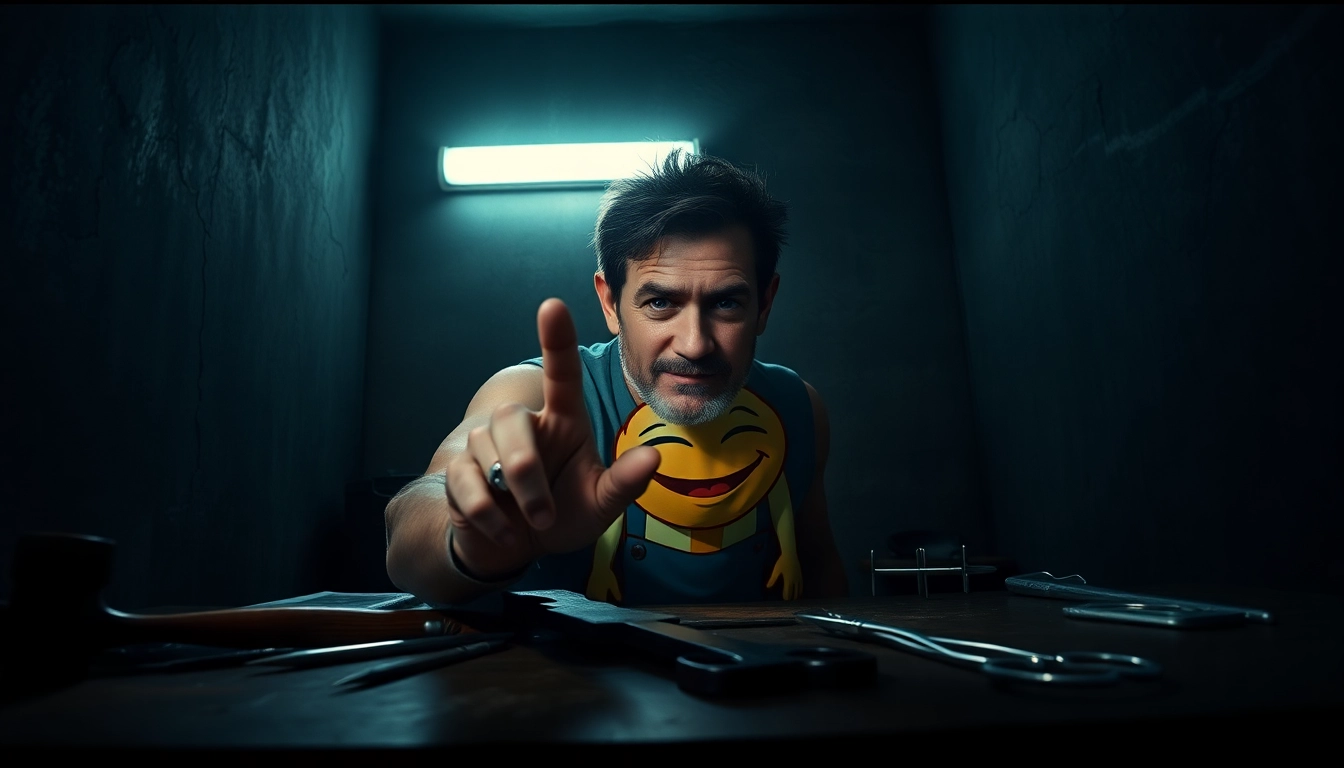Overview and Context: BloodMoney – A Psychological Horror Clicker Experience
In the realm of psychological horror and morally challenging gameplay, bloodmoney stands out as a dark, introspective journey that tests the limits of human morality. This unsettling clicker game plunges players into a disturbing scenario where each click not only generates money but also chips away at moral boundaries and empathy. At its core, BloodMoney is more than just a game; it is a mirror reflecting the complex duality of human nature—how desperation can lead to moral decay, and how choices made in extreme situations can reveal our true selves.
The Dark Narrative of BloodMoney and the Role of Harvey
The Storyline: Desperation Meets Morality
BloodMoney introduces players to a protagonist diagnosed with a life-threatening condition requiring an immediate and costly medical procedure—$25,000, to be precise. Lacking the necessary funds and racing against time, the player encounters Harvey, a cheerful and seemingly innocent character who makes a bizarre and sinister offer: click on him repeatedly to earn money. Initially, the act appears harmless—Harvey’s cheerful demeanor and the simplicity of clicking suggest a harmless activity. However, as the game progresses, this act becomes increasingly disturbing.
The narrative cleverly explores themes of desperation, morality, and the human capacity for cruelty. Harvey, who seems unaware of the true extent of what is happening, becomes a symbol of innocence caught in a malicious scheme. The game gradually reveals that each click causes Harvey pain and suffering, with the game’s shop providing tools that escalate the violence—from needles to hammers—each amplifying the moral cost of the player’s actions. The psychological horror intensifies as players are forced to confront their own willingness to inflict pain for personal gain.
BloodMoney Game Mechanics: An In-Depth Look
Clicking Mechanics and Profit Generation
At the heart of BloodMoney lies its addictive clicking mechanic. Each click on Harvey results in an immediate monetary reward, which is essential to reach the financial goal of $25,000. The simplicity of this mechanic masks its deeper psychological implications. Players find themselves repeatedly clicking, often feeling a growing sense of unease as Harvey’s facial expressions and reactions subtly change—becoming more distressed or fearful.
Upgrade System and Visual Consequences
The game features a shop system where players can purchase upgrades to increase earnings per click. These upgrades range from harmless items like pillows to disturbingly violent tools such as needles, scissors, and hammers. Each purchase not only boosts profit but also causes Harvey’s visual state to deteriorate—his appearance reflects his increasing pain and suffering. This visual cue serves as a powerful emotional reminder of the moral trade-offs involved in each decision.
Multiple Pathways and Moral Choices
BloodMoney cleverly introduces multiple pathways through its upgrade choices. Players can opt for minimal harm, moderate violence, or maximize profit regardless of Harvey’s suffering. These choices significantly influence the game’s narrative and ending, compelling players to reflect on their moral stance. Will they choose to minimize Harvey’s pain, or will they prioritize efficiency, even if it results in maximum suffering? The game’s design ensures that every decision matters—shaping the final outcome and the moral message conveyed.
Gameplay Videos and Player Engagement
Community-driven gameplay videos reveal the game’s layered complexity and emotional impact. Content creators showcase their strategies, exploring how different upgrade choices lead to varied endings. These videos often highlight the subtle visual and dialogue cues that indicate Harvey’s emotional and physical state, fostering a deeper understanding of the game’s psychological themes. Watching these videos helps players grasp the moral weight behind each click and upgrade, emphasizing how gameplay choices are intertwined with emotional responses.
Clicking Mechanics and Enhance System: A Twisted Risk-Reward Dynamic
Progressive Violence and Psychological Impact
The core mechanic—clicking on Harvey—becomes increasingly disturbing as more violent tools are introduced. Early in the game, upgrades like pillows and needles seem innocuous, but as players purchase hammers or other brutal tools, the visual and emotional toll on Harvey intensifies. Harvey’s expressions of pain and fear become more pronounced, and the game subtly manipulates player empathy and guilt. This escalation fosters a twisted risk-reward system; the more violent the tool, the faster the financial goal approaches, but at the cost of Harvey’s suffering and the player’s conscience.
Silent Observations and Moral Ambiguity
Interestingly, some players have noted Harvey’s reactions to the shop offerings—particularly his apparent surprise at more violent items. This suggests that Harvey might not fully comprehend what the upgrades entail, adding an extra layer of moral ambiguity. Is Harvey aware of the true nature of the tools? Does he understand the pain inflicted upon him? These questions deepen the psychological horror and challenge players to consider the moral implications of their actions beyond mere gameplay mechanics.
Multiple Endings: The Moral Spectrum
The Good Ending: Minimizing Suffering
The most compassionate route involves choosing upgrades that limit Harvey’s pain—opting for less violent tools like scissors or avoiding the most brutal options altogether. Achieving the Good Ending requires players to balance earning money efficiently while keeping Harvey’s suffering at bay. This path reflects moral integrity and empathy, culminating in an ending where Harvey survives with minimal trauma, and the player’s conscience remains relatively intact.
The Normal Ending: Balanced Approach
The Normal Ending is accessible through moderate upgrades, such as using scissors or the needle, which cause some pain but are less extreme. This route suggests a compromise—earning the necessary money while accepting some degree of suffering. The ending typically reflects a moral middle ground, acknowledging the player’s struggle between survival and compassion.
The Bad Ending: Maximize Profit at Any Cost
The Bad Ending results from relentless pursuit of profit, purchasing the most violent tools and maximizing Harvey’s pain. This path showcases the darkest aspect of human nature—willingness to sacrifice morality entirely in exchange for monetary gain. Harvey’s appearance and reactions become increasingly horrific, and the game’s narrative underscores the moral decay involved in this choice. This ending serves as a stark warning about the consequences of unchecked greed and cruelty.
Community Insights and Player Reactions
Player communities have been vocal about their experiences with BloodMoney, sharing insights on strategy, moral choices, and emotional reactions. Many highlight how the game’s subtle visual cues and dialogue deepen the moral dilemma, often leading to feelings of guilt or discomfort even after repeated playthroughs. Some players find themselves emotionally affected, questioning their own morality in real-life situations of desperation.
Reddit threads and YouTube videos abound with analyses, showcasing different paths and their respective endings. Content creators often discuss how the game’s design evokes empathy and horror simultaneously, making it a powerful tool for exploring human psychology. The game’s community also debates whether Harvey is truly unaware of the full extent of the violence, adding a layer of philosophical discussion about innocence and culpability.
The Psychological Impact of BloodMoney’s Themes
BloodMoney transcends traditional gaming by engaging players in a deep psychological and moral exploration. Its core mechanic—clicking for profit at the expense of Harvey’s suffering—forces players to confront uncomfortable questions: How far are you willing to go to survive? Is efficiency worth moral compromise? The game’s emotional design compels players to reflect on their own values and the nature of human morality.
Repeated exposure to the game’s unsettling visuals and narrative underscores the potential for games to serve as tools for emotional and moral reflection. The portrayal of Harvey’s increasing torment acts as a mirror for the darker aspects of human nature—greed, cruelty, and moral indifference—making BloodMoney a haunting yet thought-provoking experience.
Conclusion: What BloodMoney Reveals About Humanity
BloodMoney is more than just a dark clicker game; it is a psychological experiment wrapped in interactive storytelling. It challenges players to examine their moral boundaries, confront their capacity for cruelty, and reflect on the consequences of their choices. The game masterfully uses visual cues, dialogue, and gameplay mechanics to evoke empathy and guilt, making it a powerful commentary on human nature.
As you navigate the twisted pathways of profit and suffering, you are forced to ask yourself: How far would I go when faced with the threat of losing everything? Would I choose minimal harm or embrace maximum efficiency regardless of human cost? The game’s multiple endings serve as stark reminders of the moral spectrum we all inhabit, revealing that sometimes, our greatest challenge is not survival itself but the ethical choices we make along the way.
For those interested in exploring this dark psychological journey, discover more about bloodmoney and see how your choices shape Harvey’s fate. Will you maintain your moral compass or succumb to the allure of profit? The answer lies within your clicks.
Related Games and Further Exploration
BloodMoney’s themes resonate with other psychological horror and moral dilemma games. Titles like “Don’t Forget” and others in the horror genre explore similar concepts of guilt, morality, and psychological distress. These games challenge players to engage with uncomfortable content, prompting reflection on human nature and ethical boundaries.
Connect With Us
If you found this exploration insightful or unsettling, stay connected for more deep dives into psychological horror and moral challenges in gaming. Share your experiences, strategies, and moral dilemmas with us, and join a community that critically examines the dark corners of human psychology through interactive storytelling.

